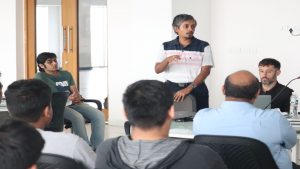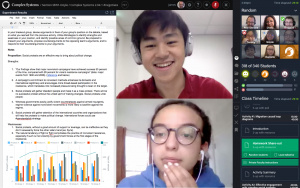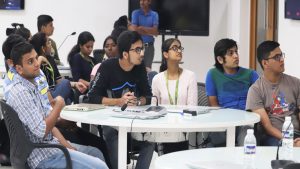Starting July 2019, engineering and liberal arts students will enroll in Collegiate Accelerator at SRM, a program built jointly with Minerva Project.
 SRM University, AP - Amaravati has partnered with Minerva Project in order to advance the intellectual development of each student. The Minerva System has been intentionally designed with a relentless focus on improving student learning outcomes and ensuring student success in high-demand careers. More specifically, the aim of the Collegiate Accelerator at SRM program is to equip students to be agile and adaptive in a fast changing world.
SRM University, AP - Amaravati has partnered with Minerva Project in order to advance the intellectual development of each student. The Minerva System has been intentionally designed with a relentless focus on improving student learning outcomes and ensuring student success in high-demand careers. More specifically, the aim of the Collegiate Accelerator at SRM program is to equip students to be agile and adaptive in a fast changing world.
WHY THIS IS IMPORTANT
With more than 65% of its human resource pool below 35 years and about 12 million individuals expected to join the workforce annually, India faces an enormous responsibility for equipping youth with skills that matter for employment. As per a UNDP study, roughly 50% of applicants appearing for interviews do not meet the skills requirement with only a few able to meet the basic requirements of employers.
A NASSCOM report also points out that more than 40% of India’s workforce needs re-skilling over the next five years to keep pace with digital disruptions transforming every sector. CEOs and industries are waking up to the reality of widening skill gaps and the ever-increasing demand for a skilled workforce. The Collegiate Accelerator program is designed to fill this demand by advancing student potential across a variety of competencies, from algorithmic thinking to written and verbal communications.
WHY MINERVA PROJECT
 As a leading innovator in higher education, Minerva Project provides top-tier programs to partners around the world. Founded in 2012, Minerva’s mission is built upon the best traditions of liberal arts and sciences education, offered through its innovative Forum platform. Committed to preparing global leaders and innovators for the complexities of the 21st century, Minerva’s curriculum teaches students those skills necessary for successful careers in any field and role.
As a leading innovator in higher education, Minerva Project provides top-tier programs to partners around the world. Founded in 2012, Minerva’s mission is built upon the best traditions of liberal arts and sciences education, offered through its innovative Forum platform. Committed to preparing global leaders and innovators for the complexities of the 21st century, Minerva’s curriculum teaches students those skills necessary for successful careers in any field and role.
Grounded in decades of research into the science of learning and developed thoughtfully over the last seven years, Minerva’s education system includes three critical components that lead to student success.
- Enhanced teaching methods: All Minerva courses employ a fully active learning model meant to help students learn and retain information.
- Unique curriculum with lessons that build upon one another to ensure student understanding and that teaches practical skills meant to help students succeed in high-demand roles.
- Dynamic learning platform called Forum that keeps students engaged in active discussion, debate, and other exercises and facilitates feedback directly from faculty to students.
Its ground-breaking creation of a new university program is detailed in the book, ‘Building the Intentional University: Minerva and the Future of Higher Education’.
HOW THIS BENEFITS STUDENTS
 By emphasizing intense, active class engagement, deliberate practice, and other empirically proven methods, The Minerva System equips students with:
By emphasizing intense, active class engagement, deliberate practice, and other empirically proven methods, The Minerva System equips students with:
- Practical skills and teaches them how to apply those skills in diverse and changing contexts.
- Further, the active-learning pedagogy establishes for students a strong foundation in key competencies like Algorithms, Critical Thinking, Creative Thinking, and Effective Communication.
- Finally, the systematic curriculum ensures that assignments become challenging at each step with a focus on real practical knowledge.
The combination of each of these components of The Minerva System – fully active learning, practice with key skills, and a scaffolded curriculum – ultimately prepares students both personally and professionally, thus boosting students’ employability.
WHAT WILL STUDENTS STUDY
 In their first semester, students will enroll in two courses, fulfilling two requirements:
In their first semester, students will enroll in two courses, fulfilling two requirements:
Introduction to Programming with Python
In Introduction to Programming with Python, students learn how to apply fundamental concepts in computer science to solve real-world problems and how to implement basic algorithmic strategies in the Python coding language. Students study how thinking like a computer scientist can improve their lives and how to apply concepts from computer science to solve difficult problems.
Communicative English
Communicative English focuses on clarity and style in communication. Students develop an understanding of why great writing and speaking matter and learn how to use effective word choice, phrasing, sentence structure, and tone across a variety of mediums.
In the second semester students will enroll in the following courses:
Applied Creative and Critical Thinking
Applied Creative and Critical Thinking engages students in the key skills that facilitate effective work in any area: logical reasoning, problem solving, and recognizing and mitigating cognitive biases. In this course, students systematically practice these skills, learn to apply them to concrete problems across domains, and gain a foundation in critical and creative thinking upon which they can build expertise in any disciplinary knowledge.
Probability and Statistics
Probability and Statistics prepares students to extract useful information from data. The course covers a range of topics including identification of the correct tool to be used for a given application to representing a problem formally by identifying the variables and parameters and creating a model using relevant data to address the problem. Students also investigate the use of descriptive statistics, examine probability and probability distributions, and study Bayesian statistics and inference as a framework for thinking about problems and prediction probabilistically.
This intensive sequence of four courses over two semesters in their first year will prepare students with the practical knowledge students to excel at and beyond their time at university, including in post-graduate and professional opportunities.
Videos
Dr Prateek: "Minerva gives the students a chance to be the main character on the stage"
Dr Prateek: "Minerva moves focus away from teaching outcomes to learning outcomes"
Dr Priyanka: "Incredible technology that encourages peer learning"
Ben Nelson: "Minerva's approach to reforming education with technology"
Kenn Ross: "We encourage students to master concepts, not tests"
Ben Nelson: "Minerva forum in the Indian context"
Prof. Rohan Shekhar: "Teaching students how to think across boundaries"
Ben Nelson & Prof. Rohan Shekhar: "Putting the focus on the students"

